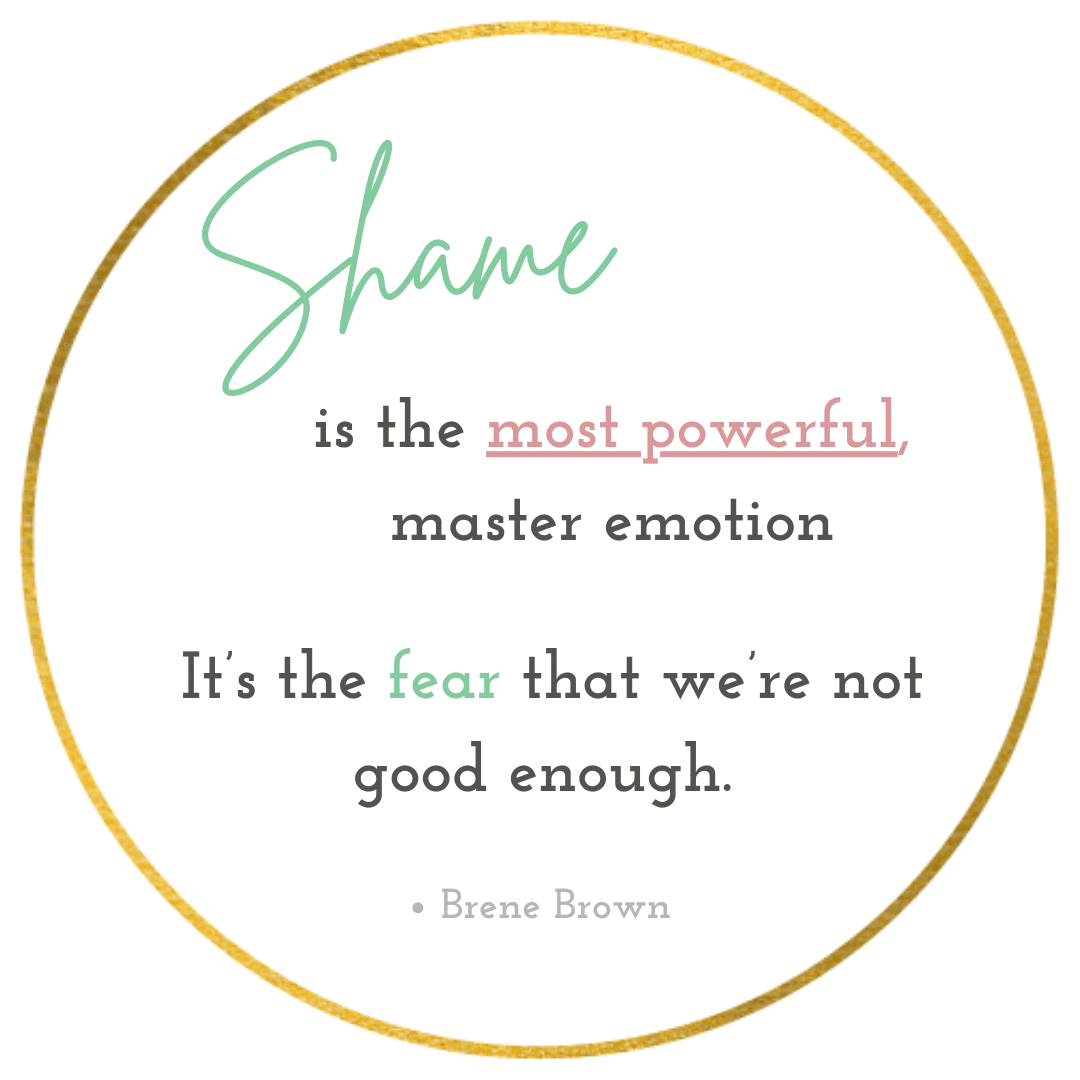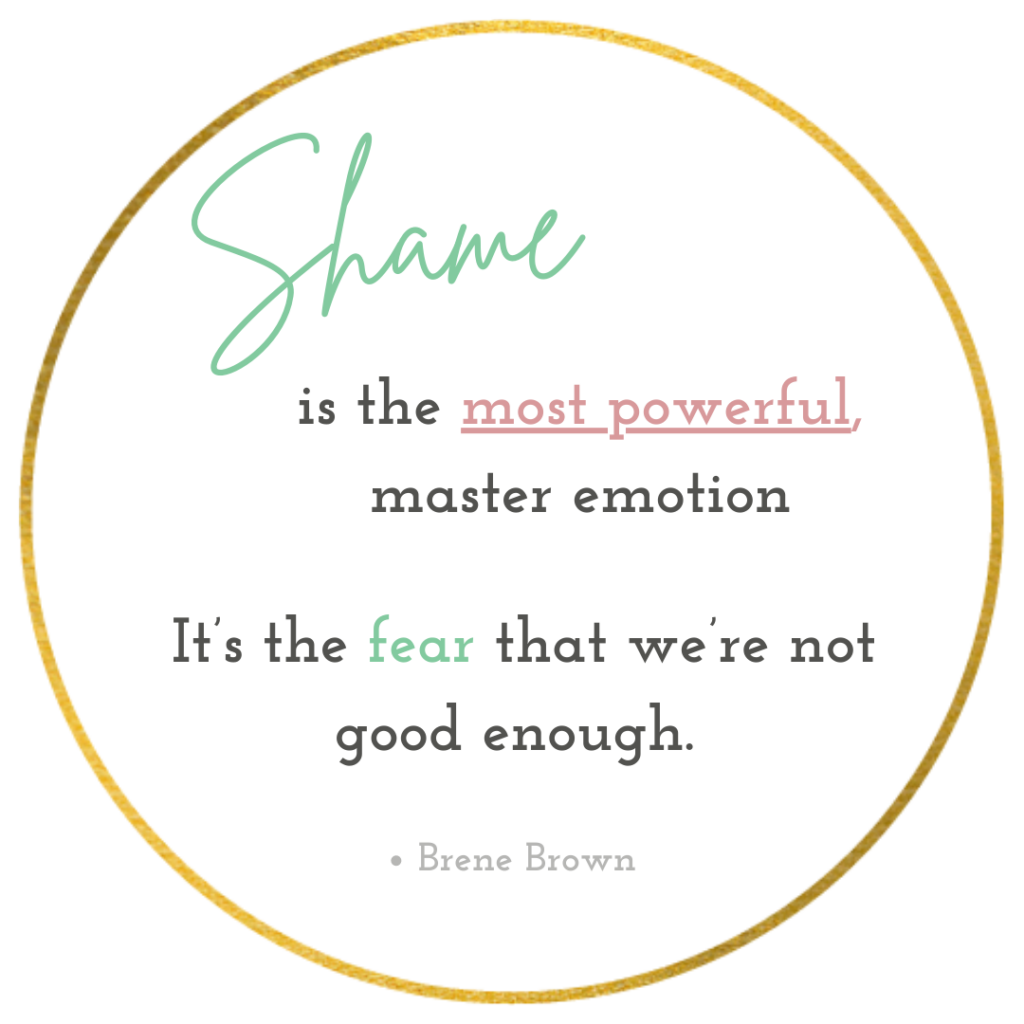Where shame, internal sh*t talking and your hormones collide

May 7, 2023
Posted On
One of my heroes is Brene Brown. Brene Brown is a clinical social worker who has awoken our society to how shame impacts the self as well as the self within societal constructs. Her work has transformed the way individuals, companies and governments interact with each other. Her insights have transformed the way individuals, companies, and governments interact with each other.
And, reading Brene’s books has truly transformed my relationship with myself.
But what does shame have to do with hormone balance?

So, what does shame have to do with hormone balance?
Luna Dolezal and Barry Lyons venture to answer this question in their article, “Health-related shame: an affective determinant of health?”.
I think all of us can readily recall memories of shame – moments that you wish you could snatch back and “do over”.
Humans are designed to adhere to some level of tribal cohesion. In other words, we want to belong. Belonging equals safety, and when we don’t belong we feel vulnerable, alone and scared which trigger a physiological response.
For some of us, shame moves beyond the acute state of “shoot, I wish I hadn’t said that” and transcends into a constant state of being which Dolezal and Lyons refer to as “chronic shame”, or as another theologian, Stephen Pattison coined “toxic unwantedness”.
Empirical research has clearly demonstrated that shame, and other ‘disengagement-related affective states’, where the subject wants to withdraw, hide or avoid social interaction, causes the body to release cortisol and PIC (proinflammatory cytokines)…with chronic shame, these levels can be persistently altered leading to a variety of negative health effects…such as ‘weight gain, heart disease, hardening of the arteries and decreased immune function…
Mental health, and specifically, how we talk to and relate to ourselves within our own heads, dramatically influences physiology which is why the entire second month of my Hormone Healing Program is dedicated to understanding which mental stressors are chronically tipping the hormone scales.
Can you relate to this scenario?
You just had a fight with your partner. It was over something stupid, but you’re not ready to apologize. You’re not even angry with your partner. You’re angry with life. You’re angry with yourself.
You feel ramped up and agitated. You want to scream, but that is not socially acceptable.
Sugar and fat are the molecules that are burned when stress comes knocking. When the fight is over, your body needs to refuel and fast.
My clients are oftentimes shocked when I suggest to them that their addiction to sugar and junk food isn’t due to a lack of discipline but actually due in part to chronic and unmetabolized stress (gut function and gut critters can also be a major factor).
“Your brain practically ensures that when you are under constant stress, you’ll go for sugary, fatty and salty foods by releasing a flood of feel-good nervous system chemicals such as serotonin and dopamine that calm your nervous system with every bite as they also bring cortisol back into normal range. That’s why they are called comfort foods – they are literally comforting your nervous system.” (Romm 54)
Cortisol is a glucocorticoid hormone released by the adrenal glands when the body perceives stress. A glucocorticoide is a hormone that regulates blood sugar.
Cortisol is a key player in the “fight or flight” response which is a response led by the sympathetic nervous system.
When the body perceives stress, the adrenals produce cortisol which provides the body with fast energy in the form of glucose. This glucose helps you to fight or flee the stressful situation you’re in.
The problem oftentimes lies in what we do with that cortisol. Rather than move and flee, which was the intention behind releasing the cortisol in the first place, we sit on the couch and soothe our stress hormones with a tub of ice cream.
As you might imagine, balancing cortisol is not a simple task. Balancing adrenal function is a daily task, one that is never “done”. That realization in and of itself can feel stressful! But, little by little we are capable of shifting our lifestyles to incorporate more and more adrenal self-care.
All of these activities help to support adrenal health and balance cortisol:
👉 Exercise
👉 Meditation (box breathing has been shown to lower cortisol by 50% which is why it’s taught to police officers and the Navy Seals)
👉 Eat veggies & protein before sugar to help keep blood sugar balanced
👉 Eat fiber-rich sugar in the form of fruit versus processed sugar
👉 Notice how shame, and your own self-talk is influencing your daily stress levels as well as what you eat.
Pin
Share
Leave a Reply Cancel reply
6 Ways To Start Your Morning Off Right
Mind + Body
Chia Seed Recipes For Keto
NUTRITION
My Morning Matcha Recipe [Bonus Recipes]
nutrition
How I Changed My Entire Life in 365 Days
Motivation
5 Signs You Should Break Up With Social Media
Mind + Body
Mind + Body
How I Detoxed in Just 3 Days [Exact Steps]
You May Also
Previous Story
next Story
© 2024 IshbelWELL The Gutsy Hormone Method. Site by Sugar Studios
Get the free guide download by over 2,000 people!
The IshbelWELL Quickstart Guide + Protocols
Join Me on Insta
I'm so glad you're here, stick around, there's so much to see,
Stay
awhile
practitioner